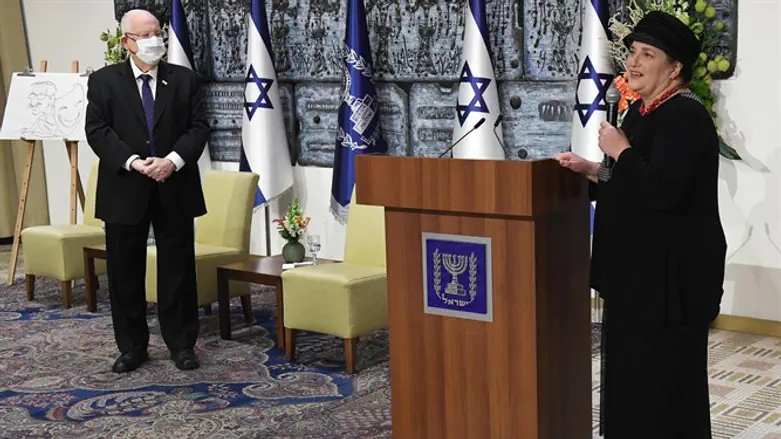
President Reuven Rivlin on Monday evening hosted a gathering in memory of former MK Uri Orbach, marking six years since his death.
The gathering was led by Uri’s wife Michal Orbach, and included humorists and satirists. Hanoch Daum, Shai Cherka and Natali Marcus spoke on a panel moderated by Ofer Hadad on satire and its role in relation to the authorities.
“In these days of roiling public discourse, I miss Uri – the virtuoso of the language who knew how to prick the balloon of hot air, big words and rage with one choice phrase, from great protests to flowery phrases that have always been part of the political playing-field,” the president said.
“When Uri took the podium to speak, it was the best show in the Knesset because even when he was an MK and a minister, Uri remained a satirist. Once, when he was teasing one of the parties and the plenum was rolling with laughter, he couldn’t help himself. He stopped, looked at the members of the party – who were laughing along with the rest – and asked ‘what are you laughing about? I’m talking about you.’ Because Uri made us laugh but also joked about us – about Israelis, about politicians, about secular, about ultra-Orthodox, and more than anything, with great self-awareness, about himself and his followers from the religious sector.”
“In his quiet way and with a little smile beneath his moustache, Uri paved a path in the religious world. He was the first of the religious satirists, from the time of his ‘psik’ column in Nekuda. In his seminal article ‘The Best to the Media’, he re-orientated young religious people and opened the pages of the mainstream media to them, or as he once said in Urbachese ‘I put a foot in the door, we turned the lights off and they all got in’. In the media and in the Knesset, Uri did not hide his views or refrain from needling his enemies with his witty barbs, but his special charm touched the hearts of even his opponents. He nearly managed to destroy the format of the popular radio show The Last Word when everyone who came to debate him ended up loving him, and as they got to know him better, they agreed with him more and more.”
“In his last job, Uri managed to turn the issue of the elderly into something living and dynamic. In his creative way, he led the country to say thank you to those who were here before us and thanks to whom we are here,” said the president at the end of his remarks.
“Uri, my dear friend, we will have to fulfil the dreams you did not manage to. Michal and the children are doing it all the time, with great love, and I am certain you are continuing to laugh at us from up there, eating your heart out that Maccabi Petah Tikva lost again, and proud of the prize for creativity in religious study that you envisaged, and mostly loving this country deeply. May your memory be a blessing.”
Michal Orbach, Uri’s wife, said, “Satire played an important part in Uri’s political life. He did not use it to put down or embarrass, but to poke at sensitive places, to prick balloons full of hot air, to look at the things that are really important. I would like to thank President Rivlin, our dear friend, for hosting this event and for many years of true friendship that began, by the way, in writing text together for the satire program Nothing To Talk About, and dear Nechama who is missed by us all.”
“This year, ahead of the fourth elections in two years, and with such a chilling atmosphere that has taken over Israeli politics, we chose to dedicate this event marking six years since Uri’s passing to the importance of satire in politics and to life in general. Uri knew that a Knesset that does not criticize itself is a deficient Knesset, and he managed to get the Knesset to laugh at itself, to drop the defenses and to get people thinking not only about the ‘what’ but also about the ‘how’. People who write satire and express strongly-held views cannot and should not sprinkle pink fairy-dust. What was special about Uri is that his criticism was to the point, not aimed at people and not from evil or hate, and so people loved him and remember him with love,” she added.
“I think that we should all adopt Uri’s approach, and allow good satire to bring us back to size, to challenge us, to wake us up. How did Uri put it when he was in hospital? Do you know what politicians’ anesthetic is? Promises! Well, if promises are anesthetic, satire is the alarm clock,” she said at the end of her remarks.
